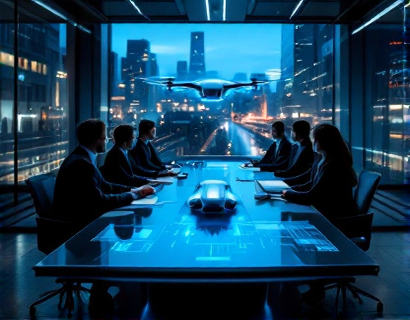Decentralized AI and Crypto: Empowering the Next Generation of Ucosystem Applications
The intersection of decentralized technologies, artificial intelligence, and cryptocurrency is giving rise to a new era of digital applications. This fusion is not only redefining how we interact with technology but also empowering users with unprecedented levels of control, security, and transparency. This comprehensive guide delves into the dynamics of decentralized AI and crypto, exploring how these technologies are revolutionizing decentralized applications (dApps) and enhancing user experiences.
Understanding Decentralized Technologies
Decentralized technologies are built on the principles of distributed networks, where no single entity has control over the entire system. Blockchain, the foundational technology behind cryptocurrencies, is a prime example. It enables secure, transparent, and tamper-proof transactions without the need for intermediaries. This decentralization extends beyond finance, influencing various sectors including computing, data storage, and application development.
AI in Decentralized Systems
Artificial intelligence, particularly machine learning, plays a crucial role in enhancing the capabilities of decentralized systems. By integrating AI into dApps, developers can create intelligent, adaptive, and autonomous applications that learn from data and improve over time. This synergy allows for more sophisticated problem-solving, personalized user experiences, and efficient resource management.
Enhancing Security and Privacy
One of the most significant advantages of combining AI and decentralized technologies is the enhancement of security and privacy. Blockchain's inherent security features, combined with AI-driven encryption and anomaly detection, create a robust defense against cyber threats. AI algorithms can monitor network activities in real-time, identifying and mitigating potential security breaches before they occur. This proactive approach ensures that user data remains confidential and secure.
Improving User Experience
The integration of AI in decentralized applications significantly improves user experience. AI-powered chatbots and virtual assistants provide instant, personalized support, guiding users through complex processes with ease. Additionally, AI-driven analytics can offer insights into user behavior, enabling developers to refine and optimize applications continuously. This results in more intuitive, user-friendly, and efficient dApps.
Decentralized AI Marketplaces
A key application of decentralized AI is the emergence of AI marketplaces. These platforms allow developers and businesses to buy, sell, and trade AI models and data sets in a transparent and trustless environment. This democratization of AI resources fosters innovation and collaboration, enabling a wider range of entities to leverage advanced AI technologies without the need for substantial upfront investments.
How Decentralized AI Marketplaces Work
Decentralized AI marketplaces operate on blockchain networks, ensuring that transactions are secure and verifiable. Developers can upload their AI models, which are then verified by the network to ensure they meet certain standards. Users can browse available models, evaluate their capabilities, and purchase them using cryptocurrency. Smart contracts automate the transaction process, ensuring that both parties adhere to the agreed terms without the need for intermediaries.
Decentralized Data Storage
Decentralized AI also benefits from decentralized data storage solutions, such as InterPlanetary File System (IPFS). Unlike traditional cloud storage, IPFS stores data across a network of nodes, making it more resilient to failures and censorship. AI algorithms can optimize data storage and retrieval, ensuring that data is accessible and efficient to process. This combination enhances the scalability and reliability of dApps, making them more viable for widespread adoption.
Autonomous Decentralized Applications
The ultimate goal of integrating AI with decentralized technologies is to create autonomous dApps that can operate with minimal human intervention. These applications can make decisions based on real-time data, adapt to changing conditions, and even evolve over time. For instance, decentralized finance (DeFi) platforms can use AI to optimize trading strategies, manage risks, and provide personalized financial advice to users.
Use Cases in DeFi
In the realm of decentralized finance, AI-driven dApps can revolutionize how financial services are delivered. AI algorithms can analyze market trends, predict price movements, and automate trading processes. This not only increases efficiency but also makes financial services more accessible to a broader audience. Additionally, AI can enhance risk management by identifying potential fraud and ensuring compliance with regulatory requirements.
Challenges and Considerations
While the potential of decentralized AI and crypto is immense, there are several challenges that need to be addressed. Scalability remains a significant issue, as blockchain networks often struggle to handle high volumes of transactions. However, ongoing developments in layer 2 solutions and more efficient consensus mechanisms are addressing these concerns. Additionally, the regulatory landscape is still evolving, and clarity is needed to ensure that these technologies can thrive in a compliant manner.
Future Prospects
The future of decentralized AI and crypto is promising, with numerous opportunities for innovation and growth. As technology advances, we can expect to see more sophisticated AI models integrated into dApps, leading to more intelligent and capable applications. The convergence of these technologies will continue to break down barriers, making technology more accessible, secure, and user-centric. The next generation of digital applications will be defined by their decentralized, intelligent, and autonomous nature, paving the way for a truly transformative digital landscape.




